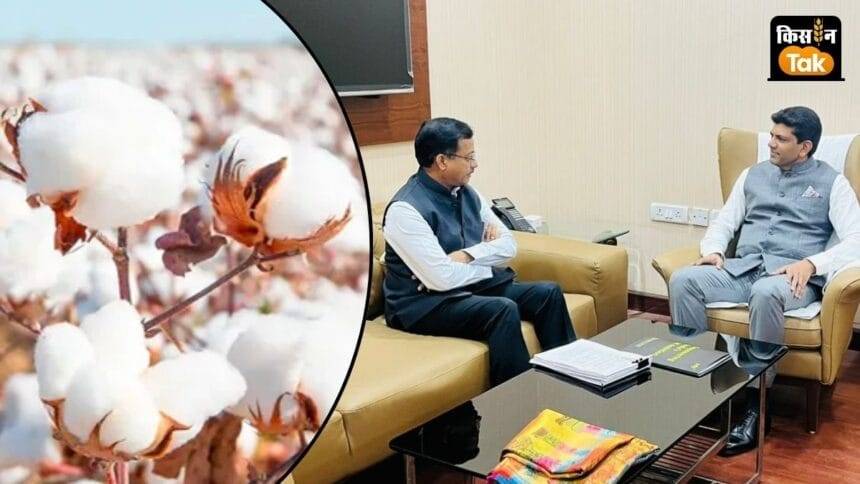Main Points In Hindi (मुख्य बातें – हिंदी में)
-
सरकारी हस्तक्षेप और न्यूनतम समर्थन मूल्य (MSP): कपास कॉर्पोरेशन ऑफ इंडिया (CCI) ने किसानों से अपील की है कि वे अपनी फसल का निपटान न्यूनतम समर्थन मूल्य (MSP) से नीचे न करें, जो कि ₹7121 प्रति क्विंटल है।
-
कमजोर खरीद प्रक्रिया और मौसम का प्रभाव: बारिश और उच्च आर्द्रता के कारण कपास की खरीद प्रक्रिया धीमी हो गई है, जिस वजह से किसानों को अपनी फसल को ₹3,000 से ₹6,000 प्रति क्विंटल की कम कीमत पर बेचने के लिए मजबूर होना पड़ रहा है।
-
किसानों का विरोध और मांगें: तमिलनाडु के कपास किसानों ने कम कीमतों को लेकर विरोध प्रदर्शन किया है, क्योंकि उन्हें मिलर्स द्वारा ज्यादा आर्द्रता के कारण कम कीमतें दी जा रही हैं या खरीदने से इनकार किया जा रहा है।
-
सरकारी उपाय और प्रोत्साहन: केंद्रीय मंत्री ने CCI के प्रबंधन से आग्रह किया है कि सभी कपास जमा का सही मूल्य पर खरीद सुनिश्चित करें और किसानों को उचित न्याय दिलाने की दिशा में कदम उठाया जाए।
- 500 खरीद केंद्रों की स्थापना: CCI ने किसानों की सुविधा के लिए पूरे देश में लगभग 500 खरीद केंद्र खोले हैं, ताकि वे अपनी फसल को उचित मूल्य पर बेच सकें और MSP के तहत कोई नुकसान न उठाएं।
Main Points In English(मुख्य बातें – अंग्रेज़ी में)
Here are the main points from the provided text regarding the challenges faced by cotton farmers in India and the actions being taken by the Cotton Corporation of India (CCI):
-
Appeal to Farmers: The Cotton Corporation of India has urged farmers not to sell their cotton below the Minimum Support Price (MSP). This appeal comes in light of farmers selling their crops at significantly lower prices due to a slow procurement process.
-
Weather Impact: Adverse weather conditions, including rain and moisture from storms, have negatively affected harvested cotton crops, compelling farmers to sell at prices between Rs 3,000 to Rs 6,000 per quintal, which is below the MSP of Rs 7,121.
-
Slow Procurement Process: The procurement of cotton for the 2024-25 marketing season has been sluggish in several key states, leading to protests from farmers who are being offered lower prices by millers citing moisture levels in the cotton.
-
Government Action: Union Minister Dr. Pemmasani Chandrasekhar has instructed CCI to expedite the procurement process and ensure that farmers’ crops are purchased without being returned due to moisture concerns.
- Support Infrastructure: To assist farmers, CCI has opened approximately 500 procurement centers nationwide, aiming to facilitate better pricing and purchasing of cotton crops under fair conditions.


Complete News In Hindi(पूरी खबर – हिंदी में)
भारतीय कपास निगम (CCI), जिसे केंद्र सरकार ने देशभर में कपास खरीदने के लिए नोडल एजेंसी के रूप में नियुक्त किया है, किसानों से अपील कर रहा है कि वे अपनी फसल को न्यूनतम समर्थन मूल्य (MSP) से कम पर न बेचे। इसका कारण यह है कि कपास की धीमी खरीद प्रक्रिया के चलते किसान अपनी फसल को बहुत कम दाम पर बेचने के लिए मजबूर हो रहे हैं। दक्षिणी राज्यों में फ़ेंगल तूफान के प्रभाव के कारण, तमिलनाडु में पिछले दो दिनों से बारिश हो रही है। जबकि अन्य राज्यों में, नमी और ओस भंडारित कपास फसल पर नकारात्मक प्रभाव डाल रही है। ऐसी स्थिति में, किसानों को कपास Rs 1000-1500 की कम कीमत पर बेचना पड़ रहा है।
भारतीय कपास निगम ने 2024-25 विपणन सत्र के लिए 1 अक्टूबर से कपास की खरीद शुरू कर दी है। हरियाणा, पंजाब, मध्य प्रदेश, महाराष्ट्र और तमिलनाडु में धीमी खरीद प्रक्रिया ने किसानों की समस्याओं को बढ़ा दिया है। तमिलनाडु के कपास किसान कई दिनों से हड़ताल पर हैं और प्रदर्शन कर रहे हैं। कारण यह है कि मिलर्स उन्हें कम कीमत दे रहे थे या उनकी खरीदी से मना कर रहे थे, यह कहकर कि कपास में नमी मानक से अधिक है।
धीमी खरीद और बारिश से किसानों की समस्याएँ बढ़ी
Madhya Pradesh में ज्वार और बाजरे की सरकारी खरीद में तेजी के कारण कपास की खरीद में धीमी प्रक्रिया जारी है। महाराष्ट्र में भी यही स्थिति है। अगर किसानों को बारिश का डर है, तो इससे खेतों और भंडारों में रखी कपास की नमी बढ़ने का खतरा है। पिछले हफ्ते, भारतीय कपास संघ ने एक बयान जारी किया था जिसमें कहा गया था कि लगातार बारिश के कारण किसानों द्वारा चयनित फसलों में भी नमी बढ़ गई है। किसान कपास को अपने घर में स्टोर नहीं कर पा रहे हैं। किसान मजबूरन कपास को Rs 3000 से Rs 6000 प्रति क्विंटल की कीमत पर बेचने को विवश हैं, जो MSP से काफी कम है, जो Rs 7121 है।
केंद्रीय मंत्री ने CCI के MD से खरीद प्रक्रिया तेज करने को कहा
रेल एवं ग्रामीण विकास राज्य मंत्री डॉ. पेमा सानी चंद्रशेखर ने कपास निगम (CCI) के अध्यक्ष और प्रबंध निदेशक ललित कुमार गुप्ता से किसानों से पूरी कपास खरीदने के कदम उठाने को कहा है। डॉ. चंद्रशेखर ने कपास में नमी की चिंताओं के कारण भंडार वापस न करने पर जोर दिया और किसानों के साथ न्याय करने की आवश्यकता बताई। उन्होंने ई-फसल प्रणाली से संबंधित मुद्दों को हल करने की भी आवश्यकता पर बल दिया।
किसानों से अपील की कि MSP से कम पर फसल न बेचें
भारतीय कपास निगम ने देशभर में किसानों को बताया है कि उनकी फसलें खरीदी जाएँगी। इसलिए उन्हें अपनी फसलें कम दाम पर नहीं बेचनी चाहिए। निगम द्वारा जारी एक बयान में कहा गया कि सभी कपास किसानों से अपील की गई है कि 12 प्रतिशत तक की नमी वाले कपास को MSP से कम में न बेचें। किसानों की सहूलियत के लिए CCI ने पहले ही देशभर में लगभग 500 खरीद केंद्र खोल दिए हैं।
यह भी पढ़ें –
Complete News In English(पूरी खबर – अंग्रेज़ी में)
Cotton Corporation of India (CCI), the nodal agency appointed by the Central Government for purchasing cotton produce across the country, has to appeal to the farmers not to sell the crop below the MSP. The reason for this has also come to light, in fact, due to slow cotton procurement process, farmers are forced to sell the crop at throwaway prices. Due to the impact of Fengal storm in the southern states, it has been raining in Tamil Nadu for the last two days. Whereas, in other states, moisture and dew are having adverse effects on the harvested cotton crop. In such a situation, farmers have to sell cotton at a lower price of Rs 1000-1500.
Cotton Corporation of India has started procurement of cotton for the 2024-25 marketing season from October 1. The slow procurement process in Haryana, Punjab, Madhya Pradesh, Maharashtra and Tamil Nadu has increased the problems of farmers. Cotton farmers in Tamil Nadu have gone on strike and protested for several days. Because, they were being given lower prices by the millers on the pretext that the moisture in the cotton was more than the standard or they were being refused to buy it.
Slow procurement and rain, moisture increased the problems of farmers
Due to speeding up of government procurement of jowar and millet in Madhya Pradesh, the process of cotton procurement is slow there. Same is the situation in Maharashtra also. If the farmers are troubled by the fear of rain, then there is a danger of dew increasing the moisture in the harvested cotton crop lying in the fields and barns. Last week, the Cotton Association of India had issued a statement saying that due to continuous rain in the last few days, the crops selected by the farmers have also been affected by moisture. They cannot store cotton in their house. Farmers are forced to sell cotton at the price of Rs 3,000 to Rs 6,000 per quintal. This MSP is much less than Rs 7121.
Union Minister asked MD of Cotton Corporation to speed up the procurement process
Union Minister of State for Communications and Rural Development Dr. Pemmasani Chandrashekhar has asked Cotton Corporation of India (CCI) Chairman and Managing Director Lalit Kumar Gupta to take steps to purchase the entire stock of cotton from farmers. Dr. Pemmasani Chandrasekhar stressed the importance of purchasing cotton stocks without returning them due to cotton moisture concerns and called for justice to the farmers. He also stressed the need to address issues related to the e-cropping system.
Appeal to farmers not to sell crops below MSP
Indian Cotton Corporation has told farmers across the country that their crops will be procured. Therefore, he should not sell his crops at low prices. In a statement issued by the corporation, it was said that an appeal has been made to all cotton farmers not to sell cotton with moisture content up to 12 percent at less than the MSP. For the convenience of farmers, CCI has already opened about 500 procurement centers across the country.




